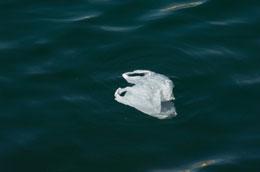 The environmentally friendly version of polythene might not be so friendly after all.
The environmentally friendly version of polythene might not be so friendly after all. Polyethylene is one of the most widely used materials in the world, and the discarded plastic bag has become one of the most potent symbols of human impact on the environment. As worries over the vast scale of waste from this plastic has grown, so has the use of purportedly 'degradable' forms of it.
Adding transition metals such as iron and cobalt can promote the oxidation of the ethylene polymers and claims for the degradability or biodegradability of these materials are widespread on food packaging and plastic bags. But a review published last week in Environmental Science & Technology1, notes that there is no evidence that 'degradable polyethylenes' are actually all they suggest.
Although it is clear that 'degradable' plastic bags, for example, will fall apart in the environment, the resulting fragments can persist for a long time, and there are no long-term studies on these pieces. A key issue is that products can be described as biodegradable without reference to the timescale it takes them to fully biodegrade. (read more)
No comments:
Post a Comment